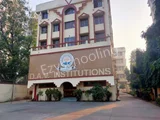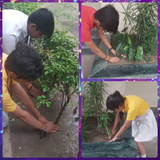
D.A.V. Public School, Taratala, Kolkata
D.A.V. Public School, Taratala, Kolkata Admission Enquiry
| Class | Session | Action |
|---|---|---|
Nursery | 2026-2027 | |
LKG | 2026-2027 | |
UKG | 2026-2027 | |
Class 1 | 2026-2027 | |
Class 2 | 2026-2027 | |
Class 3 | 2026-2027 | |
Class 4 | 2026-2027 | |
Class 5 | 2026-2027 | |
Class 6 | 2026-2027 | |
Class 7 | 2026-2027 | |
Class 8 | 2026-2027 | |
Class 9 | 2026-2027 | |
Class 10 | 2026-2027 | |
Class 11 | 2026-2027 | |
Class 12 | 2026-2027 |
D.A.V. Public School, Taratala, Kolkata Quick Facts

Board
CBSE
Gender
Coed
Classes
Nursery - 12 Class
Academic Session
April to March
Medium
English
Student Teacher Ratio
25:1
Day/Boarding
Day School
Campus Size
3409 Sq.Mtr.
D.A.V. Public School, Taratala, Kolkata Fees Structure
D.A.V. Public School, Taratala, Kolkata Documents Required
D.A.V. Public School, Taratala, Kolkata Photos & Videos
D.A.V. Public School, Taratala, Kolkata Languages Taught
D.A.V. Public School, Taratala, Kolkata Facilities
Connect with Ezyschooling Counsellor
Aishwarya
+91-87xxxxxx64
English, Hindi
Fill in your details to view phone number
D.A.V. Public School, Taratala, Kolkata Leaders Message
Vijay Laxmi Kumar
Principle
D.A.V. Public School is dedicated to the holistic development of students, nurturing them to become future-ready leaders and responsible citizens. We emphasize learning beyond the classroom, encouraging students to explore, innovate, and contribute meaningfully to the world around them.
Our curriculum, aligned with the latest CBSE guidelines, integrates 21st-century skills and global perspectives while honoring Indian values. By incorporating spiral learning and addressing diverse learning styles, we ensure every child achieves academic milestones with confidence and clarity.
Supported by a committed team of educators, we guide students through a 15-year transformative journey—shaping them into competent, compassionate individuals grounded in cultural heritage yet equipped to thrive in a dynamic, global society.
D.A.V. Public School, Taratala, Kolkata School Results

Esita Jina

BARSHA PRIYADARSHINI DASH

ATIKSHA PANDEY
D.A.V. Public School
Parent & Student Reviews
What Parents & Students Say
See what people are saying about D.A.V. Public School
Purushottam Kr Shaw
D.A.V. Public School, Taratala, Kolkata Enquire About Admissions
D.A.V. Public School, Taratala, Kolkata Address And Contact
61, Diamond Harbour Road, Near Taratala, Block 6, Sahapur
61, Diamond Harbour Road, Near Taratala, Block 6, Sahapur, Taratala, Kolkata, Kolkata - 700038
D.A.V. Public School, Taratala, Kolkata About Us
The DAV (Dayanand Anglo Vedic) Movement commemorates and perpetuates the philosophy and work of one of the greatest social and religious reformers - who appear but rarely on the stage of the world - Maharshi Dayanand Saraswati. Born in the 19th century, at a time when the Hindu society had become completely oblivious of its ancient spiritual and cultural heritage and caught up inextricably in the meshes of superstition born of intellectual poverty and false beliefs, meaningless rituals and such pernicious practices as untouchability, child marriage and inhuman treatment of women. Maharshi Dayanand raised his irrepressible voice against all these vices and shook the society to its very foundation by espousing fearlessly and relentlessly the cause of the emancipation of women, the abolition of casteism, pursuit of Swaraj and the popularisation of Hindi. Gurudev Rabindranath Tagore considered him to be the “great path maker of modern India”. He drew his inspiration and strength from the vedas which he exhorted his fellow countrymen to study and regard as with their most precious treasure. Maharshi Dayanand, with his uncanny power of observation and deduction, knew that the evils rampant in the Hindu Society could be wiped out only by the all sweeping tide of intellectual enlightenment. That is why, among the ten principles of Arya Samaj laid down by him, the most important place is held by eradication of ignorance and illiteracy through spread of. To translate this cherished dream of the great mentor into reality, the D.A.V. College Trust and Management Society, registered in 1885, laid the foundation of the first D.A.V. School at Lahore in 1886 with Mahatma Hansraj - the very soul of humility and self-abnegation as its Headmaster. “From a tiny acorn the mighty oak tree grows - this humble beginning made more than a hundred years ago has now flowered into a vigorous movement taking in its embrace some 600 educational institutions, spread all over the country, comprising colleges offering Arts, Science, Commerce, Education, Law, Ayurvedic medicine, Technical and Vocational Institutions and Public Schools. Under the guidance of the DAV College Managing Committee the number of Public Schools have shown a phenomenal growth in the last decade 1. The first efficient cause of all true knowledge and all that is known through knowledge is Parmeshvara. 2. Ishvara is existent, intelligent and blissful, lie is formless, omnipotent, just, merciful, unborn, endless, unchangeable, beginning-less, unequalled, the support of all, the master of all, omnipresent, imminent, unageing, immortal, fearless, eternal, holy and the maker of all. Me, alone is worthy of being worshipped. 3. Vedas are the scriptures of true knowledge. It is the first duty of the Aryas to read them, teach them, and hear them being read. 4. One should always be ready to accept truth and give up untruth. 5. One should do everything according to the dictates of dharma, i.e. to promote its physical, spiritual and social welfare. 6. Doing good to the whole world is the primary objective of this society i.e. to promote its physical, spiritual and social welfare. 7. Let thy dealing with all be regulated by love and justice, in accordance with the dictates of dharma. 8. One should promote Vidya (realisation of subject and object) and dispel Avidya (illusion). 9. One should not be content with one's welfare alone, but should look for one's welfare in the welfare of all. 10. One should regard one's self under restriction to follow altruistic rulings of society, while in following rules of individual welfar. The D.A.V. Public School, Kolkata is the only one in Kolkata. It is a progressive co-educational centre of child-education designed to help every child in its care to attain all-round, balanced and harmonious development of his / her personality, latent talents and capacities. Falling in line with other D.A.V. Public Schools, this School aims at not merely academic excellence but also formation of character by encouraging the children to cultivate the basic values of life like truthfulness, compassion, tolerance and patriotism.
D.A.V. Public School, Taratala, Kolkata Claim School

If you are an authorized person on this school behalf and want to start accepting applications/enquiries through ezyschooling platform for admissions, please claim this school.
Disclaimer
D.A.V. Public School, Taratala, Kolkata FAQs
The average student-teacher ratio at D.A.V. Public School, Taratala, Kolkata is 25:1.
The total cost of admission in D.A.V. Public School, Taratala, Kolkata usually starts at Rs. 62,640 and can go up to Rs. 66,780. This includes: Security Fees, Tuition Fees, Admission Fees & Annual Fees .
- Dance
- Art and Craft
- Drama
- Debate
Currently, we do not have any conclusive information on the scholarships available in D.A.V. Public School, Taratala, Kolkata. Parents can direct contact the school for information on scholarships or fee reductions of any sort.
D.A.V. Public School, Taratala, Kolkata is affiliated with CBSE board(s).
The academic session at D.A.V. Public School, Taratala, Kolkata begins in April and continues through March of the following year.
D.A.V. Public School, Taratala, Kolkata was established in the year 1988.
No, applications for D.A.V. Public School, Taratala, Kolkata aren’t available on Ezyschooling. You can apply by visiting the school in person or using its official website. You can still use Ezyschooling to explore and compare schools that match your preferences. Alternatively, you can explore Ezyschooling to discover and compare schools that best match their preferences, even if applications for D.A.V. Public School, Taratala, Kolkata are not directly available through the platform.





















